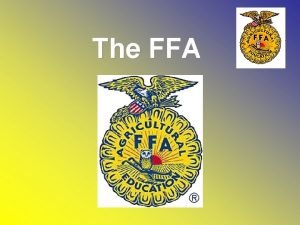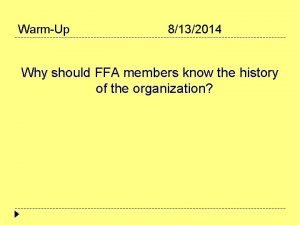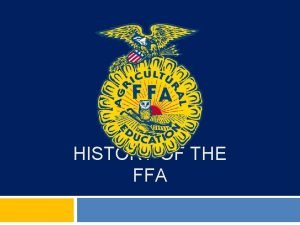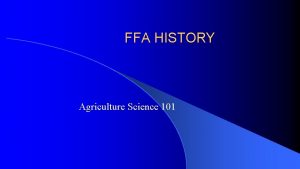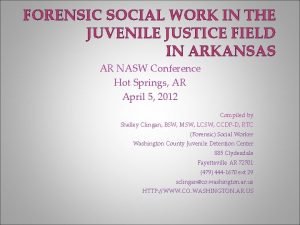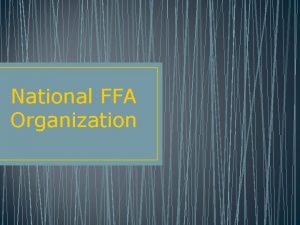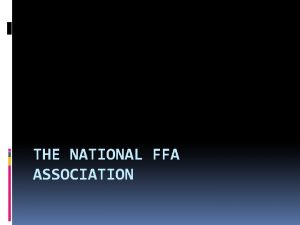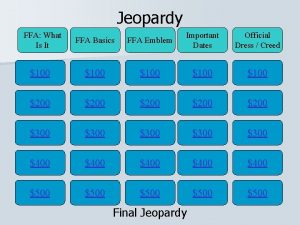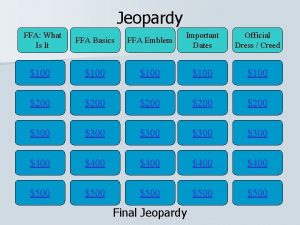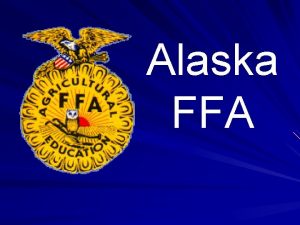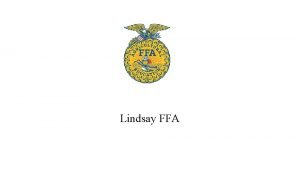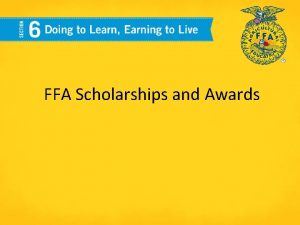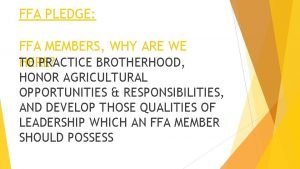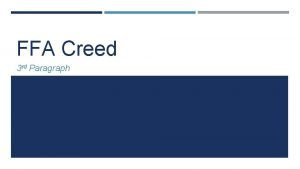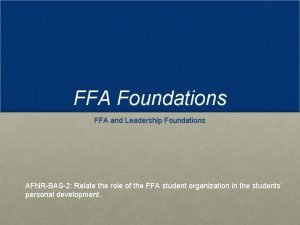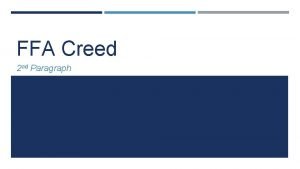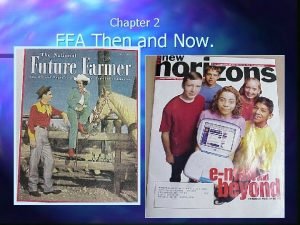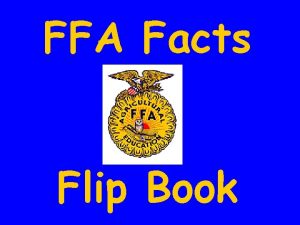THE NATIONAL FFA ORGANIZATION WHAT IS THE FFA































- Slides: 31

THE NATIONAL FFA ORGANIZATION

WHAT IS THE FFA? � The National FFA Organization used to be know as Future Farmers of America. � � When it was originally created in 1928, the FFA existed to prepare students for careers primarily in production agriculture. Agriculture had changed rapidly in the early 1900 s – horses were replaced by machinery, electricity was rapidly changing production practices, and modern science was becoming a standard part of farming. � � An organization was needed to prepare students in high school for the rapidly modernizing world of agriculture. Today, almost ¾’s of FFA members do not live on a farm, and even fewer intend to become farmers. Source: https: //www. ffa. org/documents/ffa_key_messages. pdff � � Obviously “Future Farmers” is not descriptive of most FFA members! So why does the FFA exist today?

WHAT IS THE FFA? � The National FFA Organization is a dynamic youth organization that changes lives and prepares students for: � � Premier leadership, Personal growth, and… Career success through agricultural education. An example of what works well in education, FFA is an intracurricular organization that implements the threecircle model of education � � � Classroom instruction Hands-on learning Leadership development through FFA programs. Source: https: //www. ffa. org/Donate/Foundation/Pages/Foundation-FAQs. aspx Source: www. ffa. org

IT’S “INTRACURRICULAR” � The FFA is an intracurricular organization. � � � This means that it combines classroom education with hands-on lab experiences and out-of-class activities to best prepare students for the life they want to have after high school. By combining classroom education with real-world experience, you will be best prepared to get into the college of your choice and obtain a fulfilling and rewarding career in a field that interests you. The FFA is not a club! � � Not just anyone can be an FFA member – you have to be a part of a high school that offers agricultural education. Not just anyone can be an FFA Advisor – you have to have a license to teach agriculture!

WHY JOIN FFA? � Members join FFA to prepare themselves for the careers they want to have after high school. � � � Most people do not take multiple choice exams or write essays as part of their day-to-day jobs! To be prepared for the best jobs out there, you need to have real-world skills and the ability to apply the things you learn in high school to job-related circumstances. The FFA exists to connect students to careers in agriculture, science, medicine, business, and over 300 other career paths! � � � If you think the FFA is about creating future farmers, you are ignoring the other 299 options available! While FFA members could become farmers, they could also become business owners, medical professionals, researchers, ecologists, marketers, statiticians, engineers, and even the President of the United States!

HOW IT’S DONE � So how does the FFA prepare students for the careers and colleges of their choice? � � The FFA offers a wide range of activities over the course of the entire year in order to ensure that students have the training and skills needed to advance their education and obtain that perfect career. Key Career Preparatory Activities Offered by the FFA � � � � Supervised Agricultural Experiences & Proficiency Applications Career Development Events Speaking Contests Agriscience Fair Leadership Development Community Service Scholarships Agricultural Courses

SUPERVISED AGRICULTURAL EXPERIENCES (SAE’S) � Supervised Agricultural Experiences (SAEs) are any experience you might have outside the classroom related to agriculture, science, the environment, business, and technology. � � As part of your FFA experience, you should seek to get career experience before you leave high school. SAEs are just experiences you have outside the classroom that help you to gain real-world career skills. This could be a part-time job, shadowing a professional, a research experience, starting a small business, volunteer work or other career-related activities. SAEs help you to gain marketable skills that will help you to become more hirable and prepared for a future career. � SAEs help you to get the job you want some day by getting experience in that job today.

PROFICIENCY APPLICATIONS � If you have a great SAE, you can compete against other FFA members using a form called a Proficiency Application. � � Proficiency applications are a way for you to keep track of your experiences, skills, and income. These applications enable you to show the progress you are making in becoming prepared for a career of your choice. By submitting these applications at the local, state, and national level, you can compete against other FFA members for recognition and scholarships while building your own skills and abilities. Through proficiency applications, you can gain career skills while gaining recognition and awards, all of which can improve your likelihood for college acceptance.

CAREER DEVELOPMENT EVENTS � Career Development Events (CDEs) are another FFA competition that allows you compete and gain recognition and awards while preparing for a future career. � � CDEs (or Judging Teams, as they are sometimes known) are team-based events in which you compete against other students in competitions related to careers. A Career Development Event (CDE) is basically a contest, based on current industry standards, where FFA members can demonstrate the knowledge and skills gained from 1) classroom instruction, 2) their SAE and 3) FFA activities. In Delaware, you can compete in over 25 different competitions related to many different career fields. Source: https: //sites. google. com/site/wisconsinffacdepage/ �

SPEAKING CONTESTS � FFA Speaking Contests are a specific kind of Career Development Event. � � In the FFA Speaking Contests, you can compete in several different kinds of events in order to improve your communication skills. Today, excellent communication is absolutely vital to any career path – the stronger your communication skills, the greater your likelihood of obtaining a well-paying job. Involvement in a FFA Speaking Contest proves to employers that you have the communication skills needed to be an effective employee. Contest options include 1) Prepared Speaking, 2) Extemporaneous Speaking, 3) Creed Speaking, 4) Job Interview, 5) Parliamentary Procedure

AGRISCIENCE FAIR � Agriscience Fair is a competition in which students present the findings from actual research projects related to one of the following categories: � � � 1) Animal systems – animal growth and performance; medicine 2) Environmental science – natural resources and ecology 3) Plant systems – function, structure, and reproduction of plants and plant cells 4) Power, structures, and technology (engineering) – engine performance, renewable energy, product performance, etc. 5) Social sciences (behaviors and decisions of people in business and society) – polling of groups of people, effective practices, etc. 6) Food products and processing – product development, food safety, sales, and product quality

STATE LEADERSHIP DEVELOPMENT � Leadership is a central part of the FFA’s mission. Students in this area can partake in the following leadership development events: � � � Chapter Officer Leadership Training– hosted by the State FFA Officers in Worton, MD each September. Discovery Leadership Conference – for FFA members in grades 6 -8; each November Imaged FFA Leadership- 9 th grade leadership Conference QUEST FFA Leadership Conference– this is a National FFA Conference held in March of each year for FFA members grades 10 -11. State FFA Convention – held in March. National FFA Convention – held in Louisville, KY or Indianapolis, IN

LOCAL LEADERSHIP DEVELOPMENT � FFA Members can also develop their leadership skills through involvement at the local level. � By running for an Officer Position, FFA members can gain real-world leadership experience by managing one of the largest chapters in the state and thousands of dollars of funding and expenses. � The Middletown FFA has the following officers annually: President, Vice President, Secretary, Treasurer, Sentinel, and Reporter. � You can also get leadership experience by helping during our Ag Day, in your SAE, participating in CDE’s, attending conferences � From time to time, members can also serve as Chairpersons for various events. � For example, we may need chairpersons to run food drives, FFA week, the banquet, and other events.

LEADERSHIP & FFA DEGREES � The FFA also offers degrees to its members who show leadership development and personal growth. � � These degrees recognize individual achievement in the FFA in leadership and career preparation. The FFA offers the following degrees: � � Greenhand – offered to new members who demonstrate a basic understanding of the FFA, show leadership potential, and have plans for an SAE and career preparation. Chapter – offered to members who are established, proven leaders and have shown progress with their SAE and career preparation. State – the highest degree offered in the state; it is awarded to the most elite FFA members in the state. American – this degree is the highest degree awarded to FFA members and is only awarded to the most exceptional members who have shown the greatest accomplishment in leadership, personal growth, and career preparation. Source: karenthefarmersdaughter. wordpress. com

COMMUNITY SERVICE � As part of its mission to foster the personal growth of its members, the FFA heavily emphasizes community service. � � You cannot be a well-rounded and well-prepared individual unless you can appreciate the value and benefits of serving your community and nation. At Middletown, we annually conduct the following service events: � � � � Adopt a Highway Adopt a Family during Christmas Petting Zoos Food Drives During the State Fair are the following UD Ice Cream Booth, Pork Producers, Farm Bureau The Grange

SCHOLARSHIPS � Many, many scholarships are available through the FFA. To date, more than $34 million has been provided by the National FFA for higher education scholarships. � More scholarships are also available at the state and local level. � Scholarships are also awarded on a cash basis to State Proficiency Winners and CDE National Winners. � � You can also make money through FFA Membership! Your SAE can be a part-time job in which you make money. � You can receive money back from fruit sale. � FFA Managers are paid to do their jobs. �

AG COURSES � While not specifically part of the FFA, ag courses are definitely a part of the 3 -circle model of ag education! Continued enrollment in ag courses is one of the most sure-fire ways of ensuring your continued personal development and career preparation. � Career skills, resumes, cover letters, and job interviews are regular components of higher-level ag courses at Waterford. � � Students who are most successful at Waterford in ag ed are those who take part in at least one course each year while staying actively involved in the FFA and their own personal SAE. � These experiences will pay off for you personally…. literally!

COURSES � Courses available in Middletown Agricultural Sciences – 1. 2. 3. 1. Animal Science I, III, IV Plant Science I, III Environmental & Natural Resources I, III, IV Summer SAE Experience I, III

FFA TRADITIONS

THE NATIONAL FFA ORGANIZATION � The National FFA is the largest student-run organization in the United States with our 500, 000 members annually in middle school, high school, and college. � The FFA was created in 1928. � � Waterford has the 3 rd oldest chapter in Wisconsin and was started in 1929. It is a federated system of state associations, located in all 50 states, Puerto Rico, the Virgin Islands and Guam. � � Each state is typically divided into districts or regions and each made up of numerous local chapters. FFA members engage in the FFA on a local level and have opportunities to engage on a regional, state and national level for more advanced leadership and competition activities.

HOW IT’S GOVERNED � Each school’s program is called a Chapter. � � FFA Chapters are run by an elected FFA President, an Officer Team, and advisors. Your Advisors are Mr. Billings and Mrs. Vest. Your President is Ryan Van. Sant. Each state association also has an officer team and advisors. Our State Association is divided into 10 Sections. Your Sectional State Officer is Emily Watson. Each state officer serves a 1 -year term. � Your State President is AJ Cannon, Vice-President-Jovon Townsend, Secretary Jordon Karr, Treasurer-David Townsend, Reporter-Evan Davis Sentinel-Stanley Gaffrey � Your State Advisor is ? ? ? . The State Executive Director is Stacey Hoffman. http: //www. delawareffa. org � � The National FFA is governed by 5 elected National Officers who serve 1 -year terms. https: //www. ffa. org/About/nationalffa/nationalofficers/Pages/default. aspx

FFA MISSION � FFA Mission Statement: FFA makes a positive difference in the lives of students by developing their potential for premier leadership, personal growth, and career success through agricultural education. � FFA Motto: Learning To Do, Doing to Learn, Earning to Live, Living to Serve � FFA Colors: National Blue and Corn Gold. � � These represent national unity and pride. The FFA Salute is the Pledge of Allegiance.

FFA OFFICIAL DRESS � Official Dress is the term for the ‘uniform’ of FFA members. Official Dress consists of: � � � � A FFA Jacket A white collared shirt or blouse A FFA Tie or Scarf Black dress pants or a black skirt Black socks or nylons Black shoes or heels. Like a military uniform, FFA Official Dress should only be worn for proper FFA events and should only be worn if all items listed above are present. � � You would never wear part of a military uniform because it would be disrespectful to that branch. The same is true for FFA Official Dress.

OFFICIAL DRESS RULES The jacket is to be worn only by members � The jacket should be kept clean and neat � The back of the jacket should have only: � A large official emblem � The name of the state association (Wisconsin) � Name of the local chapter � � The Front of the jacket should only have A small official emblem � The name of the individual � One office or honor � The year of that office or honor �

OFFICIAL DRESS RULES � � � The collar should be turned down and the cuffs buttoned. The FFA Jacket should only be worn during appropriate occasions and at appropriate places. A member should act professionally when wearing the official FFA jacket Members should refrain from use of tobacco and alcohol. � � In addition, members should exhibit their leadership qualities when they encounter substances including tobacco and alcohol and serve to discourage others from inappropriate behavior. All chapter degree, officer, and award medals should be worn beneath the name on the right side of the jacket. No more than 3 medals should be worn on the jacket. These should represent: � � � 1 The highest degree earned 2. The highest office held 3. The highest award earned by the member

FFA HISTORY

EARLY YEARS � 1917 - President Woodrow Wilson signs into law the Smith Hughes Act , establishing Agricultural Education as a high school subject. � � 1925 - Henry Groseclose, an instructor at Virginia Tech, creates the Future Farmers of Virginia � � This allows state and federal funding to be used to support vocational education to prepare students for future careers. The FFV becomes the basis on which the FFA is created 1928 - At a meeting in Kansas City, MO, the FFA is created. � The first National FFA Convention is held; 33 delegates from 18 states attend.

EARLY YEARS � 1930 - The FFA Creed, written by E. M. Tiffany of UWMadison, is adopted at the 3 rd National FFA Convention � 1933 - The iconic blue corduroy jacket is officially adopted as the FFA Jacket. � � This jacket has remained largely unchanged and serves as the official “uniform” of FFA members, representing unwavering commitment to key principles and ideals. 1933 - A group of FFA Members are also greeted on the White House lawn by President Roosevelt.

NFA, FFA WEEK, AND PRESIDENTS � 1935 - New Farmers of America is established in Tuskegee, AL. This was the African-American version of the FFA. � � � 1948 - FFA Week is established as the last week of February. � � This was necessary because school segregation was still legal NFA would remain in existence until 1965 when it was merged with the FFA after Brown v. Board of Education This week was chosen in honor of George Washington’s birthday 1953 - President Eisenhower becomes the first of many US Presidents to speak at the National FFA Convention � Later, Presidents Truman, Nixon, Ford, Carter, Bush, and George W. Bush would also speak at the National FFA Convention

1988 – FFA BECAME FFA � 1988 - Future Farmers of America changes its name to National FFA Organization to better reflect the expanded agricultural opportunities encompassing science, business and technology, in addition to production farming. FFA members are as likely to be future veterinarians, future scientists, future business owners, future marketers, etc. as they are to be future farmers. � This meant a new name was needed. � � FFA was kept because it was familiar but does not stand for Future Farmers of America (kind of like KFC no longer stands for Kentucky Fried Chicken – KFC now sells other kinds of meals as well).

2013 � � � � � Today, there are 557, 318 FFA members, aged 12‒ 21, in 7, 498 chapters in all 50 states, Puerto Rico and the U. S. Virgin Islands. 44% of FFA members are female; women hold approximately 50% of state leadership positions. 73% of our membership is White; 15% is Hispanic/Latino; 7% is Black/African-American; 5% is American Indian, Asian or Pacific Islander. FFA chapters are in 18 of the 20 largest U. S. cities, including New York, Chicago, Philadelphia, and Milwaukee. The 2012 National FFA Convention was host to 56, 167 members, FFA advisors and FFA supporters. 23% of teachers have five or fewer years of teaching experience. The shortage of qualified agriculture teachers is the greatest challenge facing FFA and agricultural education Collectively, FFA members earn more than $4 billion annually through their hands-on work experience. In 2011, 129 sponsors provided 1, 590 individual scholarships worth over $1. 9 million through the National FFA Organization. To date, more than $34 million in FFA collegiate scholarships have been awarded to students pursuing higher education.
 What's the ffa mission statement
What's the ffa mission statement What is the ffa pledge
What is the ffa pledge Ffa chaplain opening ceremony part
Ffa chaplain opening ceremony part Process organization in computer organization
Process organization in computer organization Block organization and point by point organization
Block organization and point by point organization Jan eberly ffa facts
Jan eberly ffa facts When was national ffa alumni association was formed.
When was national ffa alumni association was formed. Who was the first national ffa advisor
Who was the first national ffa advisor Nncc recertification
Nncc recertification National organization for urban harmony
National organization for urban harmony National organization of forensic social work
National organization of forensic social work National unification and the national state
National unification and the national state Hát kết hợp bộ gõ cơ thể
Hát kết hợp bộ gõ cơ thể Slidetodoc
Slidetodoc Bổ thể
Bổ thể Tỉ lệ cơ thể trẻ em
Tỉ lệ cơ thể trẻ em Gấu đi như thế nào
Gấu đi như thế nào Tư thế worm breton
Tư thế worm breton Bài hát chúa yêu trần thế alleluia
Bài hát chúa yêu trần thế alleluia Môn thể thao bắt đầu bằng chữ đua
Môn thể thao bắt đầu bằng chữ đua Thế nào là hệ số cao nhất
Thế nào là hệ số cao nhất Các châu lục và đại dương trên thế giới
Các châu lục và đại dương trên thế giới Cong thức tính động năng
Cong thức tính động năng Trời xanh đây là của chúng ta thể thơ
Trời xanh đây là của chúng ta thể thơ Mật thư tọa độ 5x5
Mật thư tọa độ 5x5 Phép trừ bù
Phép trừ bù độ dài liên kết
độ dài liên kết Các châu lục và đại dương trên thế giới
Các châu lục và đại dương trên thế giới Thơ thất ngôn tứ tuyệt đường luật
Thơ thất ngôn tứ tuyệt đường luật Quá trình desamine hóa có thể tạo ra
Quá trình desamine hóa có thể tạo ra Một số thể thơ truyền thống
Một số thể thơ truyền thống Cái miệng nó xinh thế chỉ nói điều hay thôi
Cái miệng nó xinh thế chỉ nói điều hay thôi

